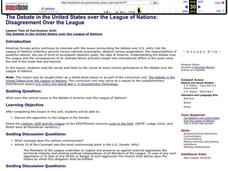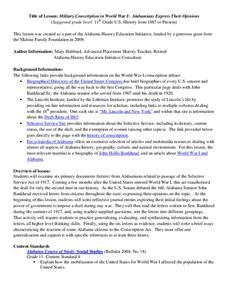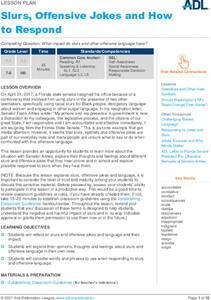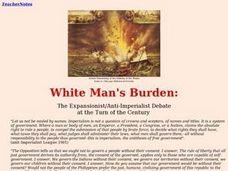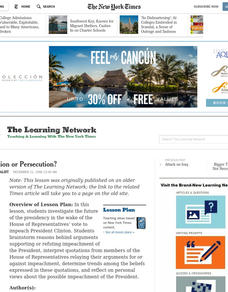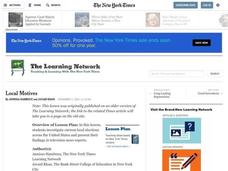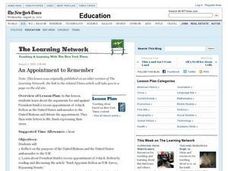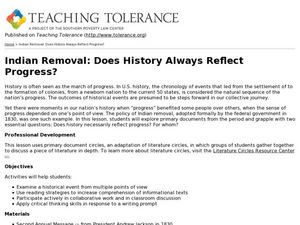C-SPAN
How A Bill Becomes A Law
Seven steps are required for a bill to become a United States law. The Families First Coronavirus Response Act (H.R. 6201) is used as a model for the process of how a bill becomes a law. Class members work independently through a Google...
Curated OER
The Debate in the United States over the League of Nations: Disagreement Over the League
Learners examine the opposition of the US Senate to Woodrow Wilson's idea of a League of Nations. They discuss the central ideas involved in the debate over the League.
Alabama Department of Archives and History
Military Conscription in World War I: Alabamians Express Their Opinions
If called, would you go? Should the US government have the power to impose a draft during any war? The Selective Service Act of 1917 (aka the Conscription Act of 1917) authorized the drafting of men into the military for only the second...
Anti-Defamation League
Slurs, Offensive Jokes and How to Respond
How to respond to slurs and offensive jokes is the topic of a lesson designed for middle and high schoolers. After journaling about their experiences with slurs and nasty jokes, participants read an article about a Florida State Senator...
Curated OER
Sounding Off About Impeachment
Help your middle and high schoolers reflect on the responsibility of newspapers to act as a vehicle for 'everyday citizens' to voice their opinions. Then, using an article about the first day of the Senate impeachment trial of President...
Heritage Foundation
The House of Representatives
The House of Representatives has a lot of responsibility in the United States government. But how did it all begin, and why is it the way it is now? A comprehensive lesson answers all of these questions about the US Constitution and...
Curated OER
The Debate in the United States over the League of Nations
Students investigate Woodrow Wilson's ideas for peace through the League of Nations. They examine how he attempted to encourage American support for the League and the opposition to it that was found in the Senate.
Center for Civic Education
What Does Returning to Fundamental Principles Mean?
Looking for materials for your Constitution Day and Citizenship Day lessons? Then check out this packet of activities that not only gets your class members thinking critically about the fundamental principles at the heart of American...
Curated OER
White Man's Burden:The Expansionist/Anti-Imperialist Debate at the Turn of the Century
Students explore the roles of Expansionists and Anti-imperialists and take on the identity of a historical character to defend their position before a Senate committee. Roles of newsmen, senators, and futurists are also assumed in this...
Curated OER
Examine Your State Government's Demographics
How is your state government organized? How many elected officials are women? What is the mean age of your state representatives? Young scholars answer these questions in a research project before creating a chart to reflect their...
Center for Civic Education
Historical Analysis of Constitutional Amendments
Each of the 27 Amendments to the U.S. Constitution were adopted within specific economic, political, social or cultural, and international contexts. As part of their Constitution Day/Week studies, seniors investigate these factors for...
American Bar Association
What Is Separation of Powers?
Who has the power? Scholars investigate the creation of the three branches of government in the United States Constitution. They analyze just why the framers created the branches the way they did.
University of Arkansas
Individuals Making a Difference
The focus of this, the third in a five-activity unit study of human rights, is on individuals who made a difference. Billy Bowlegs, Dr. Sun Yat Sen, Fannie Lou Hamer, Michi Weglyn, and Yuri Koshiyama are some of the people class members...
Curated OER
SWOT Teams: Analyzing the Political Parties for the 2010 Midterm Elections
What are political parties and what so strategists do? In this political analysis lesson, learners analyze political strategies to understand their strengths and weaknesses. They use key details from the text to learn how to create...
Curated OER
How Laws Are Made
Learners create a graphic organizer to illustrate the steps elected representatives must take to make a new law. Included: Student work sheet and role-play ideas. Students use their graphic organizers to write a paragraph briefly...
PBS
Stories of Painkiller Addiction: Prescription Drug Abuse Awareness Campaign
The I-STOP law was designed to regulate the distribution and tracking of prescription drugs. After reading an article about its signing and implementation, middle and high schoolers work together to come up with their own ideas for an...
Curated OER
Prosecution or Persecution
Investigate the future of the presidency in the wake of the House of Representatives' vote to impeach President Clinton. The class brainstorms both sides of the argument, reads and discusses an article, then analyzes and writes a journal...
Center for Civic Education
To Amend or Not to Amend, That's Been the Question...Many Times
Looking for some ideas for how to celebrate September 17, Constitution Day? Check out a packet that focuses on the factors that are considered in the amendment process. Class members examine the amendment process and the types of...
Curated OER
Local Motives
Investigate current local elections across the United States with this New York Times reading lesson. Using informational text, middle and high schoolers research local elections and create their own news reports about what they...
Curated OER
What is Meant by Returning to Fundamental Principles?
What did the Founding Fathers mean by the importance of continually returning to fundamental principles? Your young historians will analyze a series of quotations illustrating the fundamental ideals and principles of the United States...
C-SPAN
The Electoral College and the Constitution
What is the purpose of the Electoral College? Is it antiquated, or does it have a place in today's political climate? High schoolers view a series of video clips as they analyze the parts of the United States Constitution that address...
Curated OER
Structure of Congress
Students examine the structure of Congress. They identify the roles of the Democratic and Republician parties and their leaders. They role play the role of congressmen and pretend to pass new legislation.
Curated OER
An Appointment to Remember
Students examine the arguments for and against President Bush's recess appointment of John R. Bolton as the United States ambassador to the United Nations and debate the appointment. They write letters to Mr. Bush expressing their views.
Curated OER
Indian Removal: Does History Always Reflect progress?
Students explore the idea that progress for some might not mean progress for all. In this Native American lesson, students recognize different viewpoints about historical events through the study of primary documents. Students decipher...



